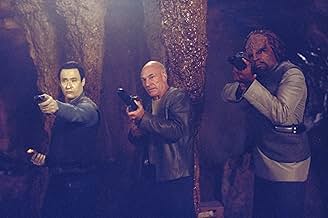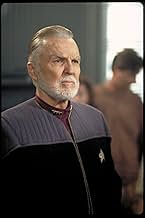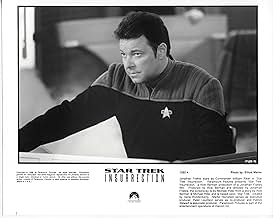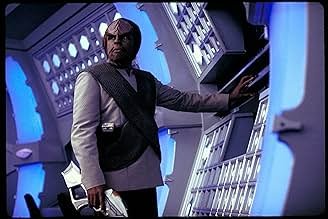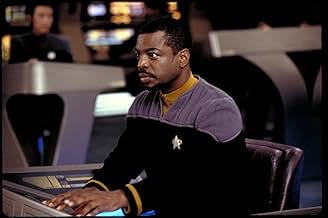CALIFICACIÓN DE IMDb
6.4/10
82 k
TU CALIFICACIÓN
La tripulación de la Enterprise descubre una conspiración de la Federación contra los habitantes de un planeta único, y el capitán Picard se rebela.La tripulación de la Enterprise descubre una conspiración de la Federación contra los habitantes de un planeta único, y el capitán Picard se rebela.La tripulación de la Enterprise descubre una conspiración de la Federación contra los habitantes de un planeta único, y el capitán Picard se rebela.
- Dirección
- Guionistas
- Elenco
- Premios
- 3 premios ganados y 8 nominaciones en total
LeVar Burton
- Geordi
- (as Levar Burton)
Opiniones destacadas
I am a big Star Trek fan and I have loved it from the first moment I saw it. I remember seeing Star Trek the first time with Star Trek 4 - The Voyage Home and The Next Generation series and I remember being at awe at the wonder of it all. It has been many years since then, and having watched the all the series and movies many times, especially the movies since they take such a sorter time to watch, it is clear to me that this movie depicts the very heart of Star Trek. Do we have the right to tell other people where to live and how to live? It is about tollerance and thinking of others before ourselves. The movies has so many magical moments and it very clearly dismisses the myth that the odd-numbered movies are worse than the others. It is not so much an action science fiction as First Contact, but Star Trek is NOT about action. I guess this is why I like the episodes with virtually no action and much character development and tests on the characters and how they cope with different situations the best. The movies does have some cliché dialog, like when Data saying 'Sattle up. Lock and load', but Star Trek is no famous for it's one-liners.
I may be in the minority when it comes to this movie, but I think it is important to defend this great Star Trek movie, especially since the really bad Nemisis came out. We have to judge this movies on it's own merits and on the idea of what Star Trek is all about.
I may be in the minority when it comes to this movie, but I think it is important to defend this great Star Trek movie, especially since the really bad Nemisis came out. We have to judge this movies on it's own merits and on the idea of what Star Trek is all about.
Insurrection features a wonderful score during the opening sequence and throughout. This added to my enjoyment of the film. I have to admit, the battle sequence between the Enterprise and the S'ona ships is too fast, poorly edited and unimpressive. Overall, however, I enjoyed the performances from Stewart and Donna Murphy and the light-hearted tone of the film. While not in the same league as First Contact, Insurrection is a satisfying Sci-Fi film which feels more like a good tv episode (with great cinematography). Don't expect FC and you'll do fine with this movie.
Though often reviewed as a typical "odd numbered" Star Trek movie (for some reason, the even numbered movies in the series have performed much better than the even numbers), Star Trek: Insurrection is actually a rather strong forte into the Trek universe.
The conflict of this film works on two levels: First, there is the conflict between two races of people (a plot point as old as time but one that, if done right, can be quite effective). Second, there is the conflict between Captain Jean-Luc Picard (and thus his crew) against upper-ranking Federation officials, who want to violate the sacred Prime Directive of the universe. Both of those areas of conflict, acting simultaneously throughout the movie, are surprisingly effective and compelling.
Besides the effectiveness of the main plot, however, this film also (much like the previous First Contact film) contains some interesting and humorous character development. While trying to rescue a persecuted race of people, the crew of the Enterprise investigates a planet on which the effects of aging are reversed. Thus, while the android Data is unaffected, other characters are taken on an interesting hormonal journey: Worf begins acting like a typical (violent!) Klingon youth, Crusher and Troi notice certain, um, body parts firming up, and Geordi LaForge regains the use of his natural eyes.
To conclude, Star Trek: Insurrection, while generally regarded as a sub-par effort, actually breaks the "odd-bad, even-good" chain of Star Trek movies. If you are new to the Star Trek universe and are interested in this movie, I would recommend watching the previous film, First Contact, in order to get a better handle on the Next Generation characters before watching this film. If you thoroughly enjoyed First Contact, this movie (with its action/adventure combined with great human drama and humor) will not disappoint you.
The conflict of this film works on two levels: First, there is the conflict between two races of people (a plot point as old as time but one that, if done right, can be quite effective). Second, there is the conflict between Captain Jean-Luc Picard (and thus his crew) against upper-ranking Federation officials, who want to violate the sacred Prime Directive of the universe. Both of those areas of conflict, acting simultaneously throughout the movie, are surprisingly effective and compelling.
Besides the effectiveness of the main plot, however, this film also (much like the previous First Contact film) contains some interesting and humorous character development. While trying to rescue a persecuted race of people, the crew of the Enterprise investigates a planet on which the effects of aging are reversed. Thus, while the android Data is unaffected, other characters are taken on an interesting hormonal journey: Worf begins acting like a typical (violent!) Klingon youth, Crusher and Troi notice certain, um, body parts firming up, and Geordi LaForge regains the use of his natural eyes.
To conclude, Star Trek: Insurrection, while generally regarded as a sub-par effort, actually breaks the "odd-bad, even-good" chain of Star Trek movies. If you are new to the Star Trek universe and are interested in this movie, I would recommend watching the previous film, First Contact, in order to get a better handle on the Next Generation characters before watching this film. If you thoroughly enjoyed First Contact, this movie (with its action/adventure combined with great human drama and humor) will not disappoint you.
It's safe to assume a lot of people think that " Star Trek : Insurrection " is more like a 2 hour episode of TNG then a film. But if you like the Star Trek TNG series then you should see Insurrection.
Personally i loved "First Contact" so when i saw "Insurrection" i wasn't expecting it to be better then First Contact. I wasn't expecting anything. Whenever i see a Star Trek movie it IS like seeing another Star Trek episode... I don't compare it to last weeks. I just want to see what the crew has to face this time and if/how they make it out OK. This Film is also filled with comedy which always works for me.
Personally i loved "First Contact" so when i saw "Insurrection" i wasn't expecting it to be better then First Contact. I wasn't expecting anything. Whenever i see a Star Trek movie it IS like seeing another Star Trek episode... I don't compare it to last weeks. I just want to see what the crew has to face this time and if/how they make it out OK. This Film is also filled with comedy which always works for me.
"We are betraying the principles upon which the Federation was founded," states Captain Jean-Luc Picard 49 minutes into the ninth Star Trek film, "It's an attack upon its very soul." "Jean-Luc," answers his superior, Admiral Dougherty, "We're only moving six-hundred people." "How many people does it take, Admiral, before it becomes wrong," asks Picard in return, "A thousand. Fifty Thousand. A million?"
The above exchange occurs during Insurrection's key scene. The entire first half of the film meticulously builds to this conversation between Starfleet officers. Dougherty (Anthony Derbe) justified his actions because the needs of the many outweigh the needs of the few. Picard (Patrick Stewart) sights the Prime Directive, which prohibits interference with other cultures or their natural development. The two officers had remained on a collision course until the moment when something had to give.
The conflict begins during a routine survey. Insurrection opens with a gorgeous panorama of an agrarian village. Children frolic about in the tall grass outside the perimeter. Farmers lift gates to aqueducts, women laugh pleasantly as they slam down their bread dough for kneading and the blacksmith works away. We are treated to long panoramic looks at the restful town and its benign inhabitants, the Ba'ku. Members of a culture survey walk about unnoticed in their isolation suits, invisible to the eye. Director Jonathan Frakes' willingness to take so much time introducing the audience to the setting demonstrates an unusual amount of focus for a movie like this.
The peace is shattered when Data (Brent Spiner) begins acting wildly. He exposes the survey and follows with many more bizarre and aggressive actions. The architects of survey, Admiral Dougherty and the So'na leader Ad'har Ru'afo (F. Murray Abraham) orbit above the planet. Data's behavior puzzles and scares them, and they ask Picard how to destroy him.
Delaying his orders, Picard (Patrick Stewart) arrives and successfully captures Data. Against the wishes of Dougherty, Picard stays to determine why his android became a loose cannon. Picard acquaints himself with Anij (Donna Murphy), a Ba'ku woman who informs him that Data told the Ba'ku that the survey team was their enemy. A short investigation uncovers a conspiracy to forcibly remove the Ba'ku from their planet.
The planet, buried deep in a gaseous cloud called the Briar Patch, has rings that act as a fountain of youth to its inhabitants. Dougherty and Ru'afo believe that the planet must be used for medical reasons, and Picard is forced to make the choice to abandon the Ba'ku or violate his orders.
It is at this point when the film accelerates. The conflict becomes a proverbial chess match between grand masters as the Enterprise crew tries to keep the planet inhabited. Both sides devise as many solutions as they can think of to accomplish their missions. The audience is almost invited to participate as the movie keeps them wondering what the next move will be.
The script shines with an abnormal level of polish. It deftly handles the question of whether an officer should obey orders or stand up for what is right. Almost every line flawlessly captures the writers' intent and communicates them to the viewers with beautiful yet easily understood diction. Every character sounds expressive and well educated. The dialogue is free-flowing and enjoyable. There is even a scene where Picard calms Data with a rousing rendition of "A British Tar." I imagine the production staff had a good laugh when they thought of that one.
The acting is of the highest Trek standards. Abraham, one of the true gentlemen in Hollywood, is exceptionally good as Ru'afo. He is so superior that he has every subtlety mastered. The way his face sneers when he says "Eliminate them," his vocal inflections, his different postures, his mannerisms, the passion and disdain in his voice all point to the work of a true master. Hatred seems to perspire from his every pore. A blood vessel bursts in his face and we can almost see hate flowing out of it. His friend Gellatin (Gregg Henry) is constantly talking him out of more extreme decisions. For Ru'afo, it is personal, but we do not find out why until the final act. He tops it all off with the best scream of anguish and frustration ever captured on film. Ru'afo may not quite be the most effective Star Trek villain, but Abraham's acting is the best in the series. He is not the most prolific actor, but he is arguably one of the best ever.
Sadly, some of the story devices fall flat. In First Contact, the Enterprise was the most advanced starship ever made. Its quantum torpedoes were so powerful that it seemed nigh invincible. Here, however, it is too weak. There is one exchange where it is fighting with two So'na ships and seems badly overmatched. The Enterprise-E was designed to take on small fleets and win. If the Federation could defeat "the Borg, the Cardassians, the Dominion," why can't the crown jewel of its fleet defeat two So'na cruisers? It is even controlled at one point by simple joystick. I never knew flying a 700-meter starcraft was so simple. Redemption does come with the ingenious denouement of the fight. There are also other moments that do not work, and some jokes fall flat.
In the end, Insurrection shoots itself in the foot. It also suffers from following First Contact and the Borg. It is an entirely different production with different goals. It may hurt itself, but in the end it is solid enough entertainment to rate a seven out of ten.
The above exchange occurs during Insurrection's key scene. The entire first half of the film meticulously builds to this conversation between Starfleet officers. Dougherty (Anthony Derbe) justified his actions because the needs of the many outweigh the needs of the few. Picard (Patrick Stewart) sights the Prime Directive, which prohibits interference with other cultures or their natural development. The two officers had remained on a collision course until the moment when something had to give.
The conflict begins during a routine survey. Insurrection opens with a gorgeous panorama of an agrarian village. Children frolic about in the tall grass outside the perimeter. Farmers lift gates to aqueducts, women laugh pleasantly as they slam down their bread dough for kneading and the blacksmith works away. We are treated to long panoramic looks at the restful town and its benign inhabitants, the Ba'ku. Members of a culture survey walk about unnoticed in their isolation suits, invisible to the eye. Director Jonathan Frakes' willingness to take so much time introducing the audience to the setting demonstrates an unusual amount of focus for a movie like this.
The peace is shattered when Data (Brent Spiner) begins acting wildly. He exposes the survey and follows with many more bizarre and aggressive actions. The architects of survey, Admiral Dougherty and the So'na leader Ad'har Ru'afo (F. Murray Abraham) orbit above the planet. Data's behavior puzzles and scares them, and they ask Picard how to destroy him.
Delaying his orders, Picard (Patrick Stewart) arrives and successfully captures Data. Against the wishes of Dougherty, Picard stays to determine why his android became a loose cannon. Picard acquaints himself with Anij (Donna Murphy), a Ba'ku woman who informs him that Data told the Ba'ku that the survey team was their enemy. A short investigation uncovers a conspiracy to forcibly remove the Ba'ku from their planet.
The planet, buried deep in a gaseous cloud called the Briar Patch, has rings that act as a fountain of youth to its inhabitants. Dougherty and Ru'afo believe that the planet must be used for medical reasons, and Picard is forced to make the choice to abandon the Ba'ku or violate his orders.
It is at this point when the film accelerates. The conflict becomes a proverbial chess match between grand masters as the Enterprise crew tries to keep the planet inhabited. Both sides devise as many solutions as they can think of to accomplish their missions. The audience is almost invited to participate as the movie keeps them wondering what the next move will be.
The script shines with an abnormal level of polish. It deftly handles the question of whether an officer should obey orders or stand up for what is right. Almost every line flawlessly captures the writers' intent and communicates them to the viewers with beautiful yet easily understood diction. Every character sounds expressive and well educated. The dialogue is free-flowing and enjoyable. There is even a scene where Picard calms Data with a rousing rendition of "A British Tar." I imagine the production staff had a good laugh when they thought of that one.
The acting is of the highest Trek standards. Abraham, one of the true gentlemen in Hollywood, is exceptionally good as Ru'afo. He is so superior that he has every subtlety mastered. The way his face sneers when he says "Eliminate them," his vocal inflections, his different postures, his mannerisms, the passion and disdain in his voice all point to the work of a true master. Hatred seems to perspire from his every pore. A blood vessel bursts in his face and we can almost see hate flowing out of it. His friend Gellatin (Gregg Henry) is constantly talking him out of more extreme decisions. For Ru'afo, it is personal, but we do not find out why until the final act. He tops it all off with the best scream of anguish and frustration ever captured on film. Ru'afo may not quite be the most effective Star Trek villain, but Abraham's acting is the best in the series. He is not the most prolific actor, but he is arguably one of the best ever.
Sadly, some of the story devices fall flat. In First Contact, the Enterprise was the most advanced starship ever made. Its quantum torpedoes were so powerful that it seemed nigh invincible. Here, however, it is too weak. There is one exchange where it is fighting with two So'na ships and seems badly overmatched. The Enterprise-E was designed to take on small fleets and win. If the Federation could defeat "the Borg, the Cardassians, the Dominion," why can't the crown jewel of its fleet defeat two So'na cruisers? It is even controlled at one point by simple joystick. I never knew flying a 700-meter starcraft was so simple. Redemption does come with the ingenious denouement of the fight. There are also other moments that do not work, and some jokes fall flat.
In the end, Insurrection shoots itself in the foot. It also suffers from following First Contact and the Borg. It is an entirely different production with different goals. It may hurt itself, but in the end it is solid enough entertainment to rate a seven out of ten.
¿Sabías que…?
- TriviaIn the scene where Captain Picard and the Admiral are in Picard's ready room, there is a cloth on the back of Picard's chair. This is the cloth given to him by the Mintakans in Who Watches the Watchers (1989), an episode in which Starfleet used a duck blind for anthropological purposes.
- ErroresTroi comments that she had never kissed Riker with a beard before. Yet Troi had kissed the bearded Riker in Ménage à Troi (1990), as well as in several other occasions on Viaje a las estrellas: La nueva generación (1987).
- Citas
Admiral Matthew Dougherty: Jean-Luc, we're only moving 600 people.
Captain Picard: How many people does it take, Admiral, before it becomes wrong? Hmm? A thousand, fifty thousand, a million? How many people does it take, Admiral?
- Versiones alternativasThe original version of the movie contained several scenes that were cut before release:
- an extended library scene in which Riker and Troi throw small paperballs at each other. This scene also include some lines by the Librarian (Lee Arone-Biggs) and a Trill Officer (Max Grodénchik);
- a scene in which Picard and Anij kiss each other;
- a scene in which Picard spills cheese on a PADD displaying the Briar Patch;
- the actual ejection of the warp core;
- Data punching some Son'as on the planet and nailing them with iso-linear tags;
- "There will be no cover-up!" line on the Son'a ship.
- Bandas sonorasTheme from Star Trek: The Motion Picture
by Jerry Goldsmith
Selecciones populares
Inicia sesión para calificar y agrega a la lista de videos para obtener recomendaciones personalizadas
- How long is Star Trek: Insurrection?Con tecnología de Alexa
- What is 'Insurrection' about?
- Who returns from the previous movie?
- What does "insurrection" mean?
Detalles
- Fecha de lanzamiento
- País de origen
- Sitio oficial
- Idioma
- También se conoce como
- Star Trek: Insurrection
- Locaciones de filmación
- Convict Lake, California, Estados Unidos(Data enters the lake)
- Productora
- Ver más créditos de la compañía en IMDbPro
Taquilla
- Presupuesto
- USD 58,000,000 (estimado)
- Total en EE. UU. y Canadá
- USD 70,187,658
- Fin de semana de estreno en EE. UU. y Canadá
- USD 22,052,836
- 13 dic 1998
- Total a nivel mundial
- USD 112,587,658
- Tiempo de ejecución1 hora 43 minutos
- Color
- Mezcla de sonido
- Relación de aspecto
- 2.39 : 1
Contribuir a esta página
Sugiere una edición o agrega el contenido que falta

Principales brechas de datos
By what name was Viaje a las estrellas: Insurrección (1998) officially released in India in English?
Responda


